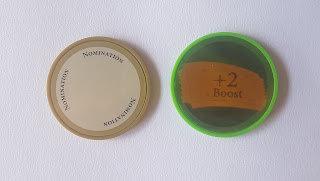The Game to Pick a Game: Review
Information:
Mechanics: Bidding, Filler, Variable Player Powers
Player Age: 5+
Player Count: 2 - 4 Players
Time to Play: 5 Minutes
Game Designer: Adam Carlson, Josh J. Carlson
Game Artist: Melonie Lavely, Anthony LeTourneau
Publisher: Chip Theory Games
Expandable: Another base game and expansions available
Year Published: 2018
Disclaimer: A review copy for the game was provided by the publisher.
Player Age: 5+
Game Designer: Adam Carlson, Josh J. Carlson
Game Artist: Melonie Lavely, Anthony LeTourneau
Publisher: Chip Theory Games
Expandable: Another base game and expansions available
Year Published: 2018
Disclaimer: A review copy for the game was provided by the publisher.Objective:
Have you ever had the issue of choosing which of the many games to play? Especially when players bring their own games and have their own preferences. Well 'The Game to Pick a Game' looks to solve that issue! No longer will you have to decide what to play. Now you can simply play this quick game to then make the decision for you.Chip Anatomy:
Character and Trait:
Each player has a chip and character sheet that will designate their character. This chip will also have a legend showing their corresponding bidding chips found on the flip side. Traits are the special abilities that make each character unique. Each character has two traits that you can use every game or you can choose to only use one and swap them for variability.Bids:
Each player will have three bid tokens consisting of +2, -1 and invert. The invert face on the chips will convert the total of the nomination to a negative if the value is positive, or vice versa. Two inverts on one nomination will cancel each other out.Nomination/Boost:
This is the chip that will be used to nominate the game you want to play. Each player is able to nominate one game to play next. If the player doesn't want to nominate a game then it can be used in the boosting round as a +2.Round chip:
This chip will be given to the first bidder of each round. In this game the turn order will change based on the total of the revealed side of the bids on each game. This will be used to determine the first bidder for each round.How to Play:
Once every player has chosen a character and their corresponding chips, there will be three rounds consisting of nomination, bidding, and boost.Nomination Round:
In clockwise order beginning with the first player (the person who chose to play), choose to either nominate a game to be potentially played or pass. The act of passing will end in no game nomination but a boost token will be gained for the boost round.Bidding Round:
The last player to nominate gets to begin the bidding round. On their turn they can either play a trait and resolve the ability or play a bid face down on a nomination. Once every player has had a turn, a new round will begin. The first player for the next round is determined by calculating the face up (backside) values on each nomination, as each chip has two sides. The player whose nomination has the highest value will go first the next bidding round.Boosting Round:
After all the bidding rounds are concluded by each player no longer having any chips, each nomination will be calculated by adding the face down value of the chips together. Remember to invert the the positive or negative if there is an invert ability chip. Once all these chips are tallied any player can play their boosting chip to add 2 to the final score of any nomination.Final Thoughts:
Pros:- Fun micro game to help determine what games to play.
- Outstanding components.
- The traits keep the game refreshing.
- Eliminates the eternal struggle of indecision for which games to play out of many.
Meh:
- This would excel with more players than 4, so I would recommend getting expansion packs or the other edition if you are interested.
Cons:
- As it currently plays, it doesn't make sense as a two player game.
- The players need to be actively involved in the bidding process or else the bidding could be altered randomly and a non-desirable game could be chosen in the end.
‘The Game to Pick a Game' sits in a weird zone between recommended and not enjoyable. It requires a very particular group of players that are all involved with the bidding process, with maybe one or more soft spoken players that would like help getting their recommendations across. If the players are not interested than the bids will be randomised and chaotic and you may end up with the worst game chosen that no one really wanted. However, when the players are truly engaged this game can help shy players to voice the games that interest them, while also remaining a fun and engaging game to play in itself. I would enjoy seeing a two player ruleset as I believe this could excel with partners choosing games for a game night. Ultimately, I would recommend the game for gamers with analysis paralysis when it comes to looking at their game shelf, and I would recommend that they get both versions so that there are multiple characters to alter gameplay and a wider player range for the engaged party atmosphere.
Click...feed the addiction:
Chip Theory GamesGame to Pick a Game on BGG
Expand Your Game Facebook page
Expand Your Game Instagram







Comments
Post a Comment